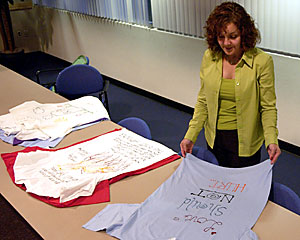 |
|
CHRIS CODUTO / Arizona Daily Wildcat
|
Tina Tarin, an OASIS Program violence prevention specialist, browses through t-shirts with messages from survivors and victims of domestic violence.
|
|
|
By Cassie Blombaum
Arizona Daily Wildcat
Tuesday, March 1, 2005
Print this
Victims of domestic violence are all around us. They walk the same streets, work the same jobs and share the same classes, but many of them are too afraid to share their story.
According to a 1998 Commonwealth Fund survey, nearly 1 1/3 of American women report being raped or physically assaulted by a current or former boyfriend at some point in their lives.
An estimated 4.5 million physical assaults are committed in the United States against women by intimate partners annually, according to the U.S. Department of Justice.
And these are only the assaults reported to police.
One UA student has struggled with domestic violence and decided to share her story.
Jen, whose name has been changed to protect her identity, a political science freshman, said that at first, her abusive boyfriend seemed really nice and showed no signs of violent tendencies.
"When he first started getting abusive, I was 17. We dated on and off for six years, and he turned evil," Jen said. "He didn't start showing signs of abuse towards me, (but he did show signs) toward his sister."
Jen said it wasn't until he was involved in a car accident that he started behaving irrationally.
"He was in a car accident, and then after that he started getting really angry," Jen said.
During their relationship, Jen said her boyfriend broke two of her ribs and gave her several black eyes.
"After my surgery, he reopened the wound by kicking me really, really hard," Jen said. "I have gotten a lot of black eyes from him, and I have a scar on my face from him hitting me."
Jen said having her ribs broken hurt, but she never attempted to go for help.
"(I didn't go for help) because I was in denial about it," Jen said. "I just kept to myself for a while until one night it got really, really bad (when) he broke the ribs, and I told my parents, and that was it."
Jen also said she frequently sees him but has not talked to him since she ended the relationship about a year ago.
"I see him around town, but I'd never talk to him again," Jen said.
When asked about the advice she would give to those involved in an abusive relationship, she said it is always best to leave as soon as possible.
"Don't take it," Jen said. "Get out while you still can. Learn the signs; even if it's just like playing around a lot, it (can get) really serious."
Tina L. Tarin, an OASIS Program violence prevention specialist at Campus Health Service, said a lot of people are too afraid to step forward and speak out because they fear for their safety.
"Many victims are too afraid of their abuser to do anything," Tarin said.
"This is quite common, especially in situations where the abuser has access to all the money, identifications or if the victim is an immigrant and has been threatened with deportation by the abuser."
Tarin said another reason many people are too afraid to come forward is because of the social stigma associated with domestic violence.
"Society often blames victims for not leaving the situation," Tarin said. "Leaving someone you love is never easy even if there is no abuse; you want to attempt to work through problems and stay together."
Tarin said many victims of domestic violence also refuse to get out of a violent relationship because they feel hopeless or threatened by their abuser.
"They don't want to give up on a relationship if there is the hope that things will improve," Tarin said. "Many victims stay out of fear of more serious harm, (such as) death if they leave, do not have access to money to get away or have children to consider when making the decision to stay or leave."
Tarin said there is a stereotype of victims of domestic violence already having problems of low self-esteem, dependency, financial stability and education. But these are untrue. Domestic violence does not affect one demographic or stereotype, she said.
"Domestic violence crosses all economic, racial and educational boundaries," Tarin said. "It occurs in wealthy and poor families. Victims are well-educated college professors and minimum-wage workers."
Tarin said she defines domestic violence as a situation or relationship in which one person has significant power over the other, which usually show strong warning signs of a violent or abusive relationship.
In some cases, the relationship may seem wonderful at first but may turn violent later on, Tarin said.
"Someone who showers you with affection and gifts very early on in a relationship (may be showing signs of an abuser)," Tarin said.
Tarin also said people who have lived in an abusive home tend to perpetuate violent behavior.
"Not all children who witness domestic violence go on to be abusive adults," Tarin said. "However, witnessing or hearing abuse in a home increases the chances greatly that children will model the behavior in their relationships as adults."
Tarin said anyone who is in an abusive relationship should call the National Domestic Violence Hotline at 1-800-799-7233.
Tarin said survivors of domestic violence should not hesitate to talk to a loved one, and victims may find counseling relief at OASIS, which provides free counseling and crisis intervention for any staff, student or faculty member affected by relationship violence, sexual assault or stalking.
ABUSE help
If you feel you or someone you know is a victim of domestic violence call The Brewster Center at 1-877-472-1717 or (520) 622-6347
